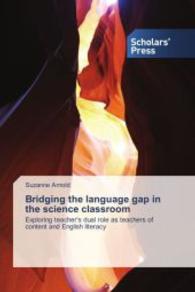Full Description
This highly anticipated book by the Pulitzer Prize winning critic Andrea Long Chu asks one of the most urgent questions of our time: what is authority when everyone has an opinion on everything?
'A rigorous thinker armed with a killer turn of phrase'
Observer
'Her writing is razor-sharp, personal, and vociferous in its proclamations, but it's also fun - it's got bite'
New Statesman
'Fun reading'
Guardian
'A galaxy-brain-level thinker' Torrey Peters
'One of the most charismatic and original thinkers at work today' Brandon Taylor
'Thrilling... Authority reminds us we haven't yet felt all there is to feel' Kaveh Akbar
'A pure joy to read' Claire Dederer
Since her canonical 2017 essay 'On Liking Women', the Pulitzer Prize-winning critic Andrea Long Chu has established herself as one of the most provocative, funny, brilliant and stylish critics at work today. With devastating wit and polemical clarity, she defies the imperative to leave politics out of art, instead modeling how the left might brave the culture wars without throwing in with the cynics and doomsayers.
Authority brings together Chu's critical work across a wide range of media—novels, television, theater, video games—as well as an acclaimed tetralogy of literary essays first published in n+1. As a critic, Chu places The Phantom of the Opera within a centuries-old conflict between music and drama; questions the enduring habit of reading Octavia Butler's science fiction as a parable of slavery; teases out the ideology behind Hillary Clinton's (fictional) sex life; and charges fellow critics like Maggie Nelson and Zadie Smith with a complacent humanism.
The unifying theme of the book is authority and taste in literature, art, culture and politics: how do we decide what's good, and how do we convince others that our judgement is correct?








